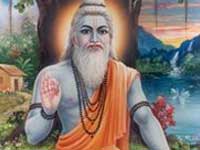Just In
- 57 min ago

- 9 hrs ago

- 10 hrs ago

- 10 hrs ago

Don't Miss
- Sports
 IPL Points Table 2024 After Today's Match, KKR vs RR: Check Indian Super League Standings And Results On April 16
IPL Points Table 2024 After Today's Match, KKR vs RR: Check Indian Super League Standings And Results On April 16 - News
 UAE Weather Report: Floods Hit Dubai, 18 Dead; Govt. Shuts Schools, Colleges
UAE Weather Report: Floods Hit Dubai, 18 Dead; Govt. Shuts Schools, Colleges - Education
 UPSC Success Story: A Bombay IITian, A Government Job Holder at Railways, Quit the Job and Emerged as an IAS
UPSC Success Story: A Bombay IITian, A Government Job Holder at Railways, Quit the Job and Emerged as an IAS - Movies
 Kapil Sharma Reaches Vaishno Devi; Offers Prayers To The Shrine By Singing ‘Tune Mujhe Bulaya’, Watch
Kapil Sharma Reaches Vaishno Devi; Offers Prayers To The Shrine By Singing ‘Tune Mujhe Bulaya’, Watch - Finance
 10 Bonus Shares, 1:2 & 1:5 Splits; Smallcap Steel Stock Below Rs 15, Falls 10% In 5 Days; Plans FPO Ahead
10 Bonus Shares, 1:2 & 1:5 Splits; Smallcap Steel Stock Below Rs 15, Falls 10% In 5 Days; Plans FPO Ahead - Automobiles
 Jeep Compass Gets More Powerful 268.3bhp Turbo Petrol Engine – Check Out All The Details Here
Jeep Compass Gets More Powerful 268.3bhp Turbo Petrol Engine – Check Out All The Details Here - Technology
 Redmi Pad SE With 90Hz Display Launching on April 23 in India; Could Be Priced for Less Than Rs 20,000
Redmi Pad SE With 90Hz Display Launching on April 23 in India; Could Be Priced for Less Than Rs 20,000 - Travel
 From Coconut Breaking on Head to Men Dressing as Women: 12 Unique Indian Rituals Explored
From Coconut Breaking on Head to Men Dressing as Women: 12 Unique Indian Rituals Explored
Veda Vyasa - Part I

Hinduism was then facing the danger of total annihilation. The scriptures were fast fading away even among those who were supposed to be the custodians of the sacred lore. The Mantras of the Vedas were being slowly forgotten by the people; in that general forgetfulness of the generation the entire subjective science of the Vedas would have been lost - had it not been for the great revolutionary reformer, the poet philosopher known as Vyasa.
Vyasa found that the members of his generation had come to live in an age of increased competition. In their preoccupation with life, learning dwindled, because they suffered - as we do today - the consequences of their intemperate living and the natural sorrows of an age of growing population pressure on the land. These conclusions are all conjectures, since we have no data to substantiate any positive view. Vedic India is to us a land of no historical reports; it refuses to talk to us.
The Vedas
Whatever the reason - and certainly there must have been sufficient reason - Vyasa, who was at once a far-sighted visionary and close observer of the cultural trends of his time, found the heroism to blast the then existing tradition and for the first time gather the Vedic Mantras and record them in written language. Until this time, every new edition of the Vedas had been composed in the mouth of the Guru and printed directly on the memory slabs of his pupils' hearts.
As Vyasa moved around the country, he soon realized that various versions of the same Vedas, such as the Benaras version and the Deccan version, had slowly infiltrated the original texts. He therefore collected all the Vedic passages and for the first time edited them into written volumes which constitute the four great Vedas as they are known today.
In compiling the Vedic Mantras, Vyasa edited them into four books, the Rig Veda, the Yajur Veda the Sama Veda, and the Atharva Veda. However, the systematic thinker in Vyasa was not satisfied with merely classifying the entire wealth of Vedic knowledge into four volumes; in each volume he also brought about a harmonious rhythm, both in the arrangement and in the classification of the contents.
Vyasa divided each book roughly into four sections: Mantras (chants or hymns), Brahmanas (rituals and rules of conduct), Aranyakas (methods of subjective worship), and Upanishads (philosophic revelations). The Upanishads are thus found in the last section of each Veda, and therefore the philosophy of the Upanishads has come to be called Vedanta. "the end of the Veda".
About the author
Swami Chinmayananda
Swami Chinmayananda the great master's lectures were an outpour of wisdom. He introduced the Geetha Gnana Yagna. He wrote a lot of books on spirituality, commentaries to Vedantic texts, children books etc. He then started spreading His teachings globally.....
-
 faith mysticismImportant Facts About Vedic Astrology
faith mysticismImportant Facts About Vedic Astrology -
 faith mysticismNature Is Our Own Echo-Part II
faith mysticismNature Is Our Own Echo-Part II -
 faith mysticismNature is Our Own Echo!-Part I
faith mysticismNature is Our Own Echo!-Part I -
 swami chinmayanandaSankara, The Mighty Missionary
swami chinmayanandaSankara, The Mighty Missionary -
 anecdotesWorldly Attachment And Worthless Distress.
anecdotesWorldly Attachment And Worthless Distress. -
 anecdotesOne False Step
anecdotesOne False Step -
 yogaYoga And Ayurveda-Part I... Contd.
yogaYoga And Ayurveda-Part I... Contd. -
 thoughtThe Essence of Srimad Bhagavatam
thoughtThe Essence of Srimad Bhagavatam -
 swami chinmayanandaVeda Vyasa - Part III
swami chinmayanandaVeda Vyasa - Part III -
 swami chinmayanandaVeda Vyasa - Part II
swami chinmayanandaVeda Vyasa - Part II -
 thoughtThe Transient Life
thoughtThe Transient Life -
 thoughtReorganize Yourself Personally
thoughtReorganize Yourself Personally


 Click it and Unblock the Notifications
Click it and Unblock the Notifications



